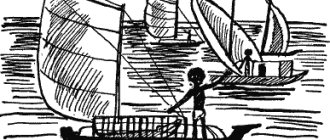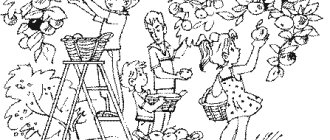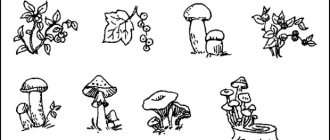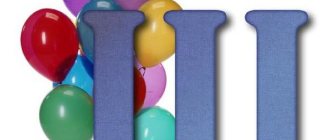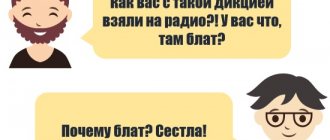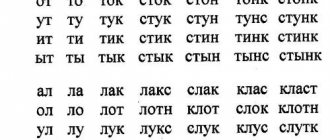- home
- Speech development
Your baby has learned letters and is actively adding syllables and small words. It's time to move on to more complex but interesting tasks - reading texts. But here parents and teachers expect some difficulties. It is impossible to offer a preschooler text cards without taking into account the characteristics of age and the degree of development of syllable reading skills. We will tell you in our article how to choose texts for reading for preschoolers, where to find and how to correctly print out texts for reading by syllables for younger and older preschoolers.
Age characteristics of preschoolers
After 5 years of age, kindergarteners are very active, mobile, and inquisitive. They grow up rapidly, get smarter, develop physically and mentally. When preparing for school and teaching syllable reading, parents and teachers should pay attention to the following age-related characteristics of children 4-7 years old:
- The basic needs of kindergarteners are communication and games. Children ask many questions to adults, themselves, and peers. They learn by playing.
- The leading mental function is imagination, fantasy. This helps to show creativity.
- Emotions, impressions, positive experiences are important for further development and the desire to continue activities. A 5-7 year old kindergartener needs praise, support, and no comparison with other children.
- Cognitive processes are actively developing: attention, memory. At the age of 5-7, preschoolers can remember and analyze a large amount of information. But it needs to be given in doses, trying not to overload the child’s brain in one lesson.
- Speech becomes more developed. At 5 years old, the child speaks in complex sentences, can choose several synonyms for one word, knows many poems, riddles, and several fairy tales by heart.
- A kindergartener wants to experience new things and learn. The baby is spurred on by curiosity; he is interested in everything new and unknown.
Consider the age and individual characteristics of preschoolers when choosing texts to read. In this case, training sessions will be more effective.
Tables of syllables for training reading techniques: compilation
Training reading technique is a rather complex process. As we have already said, it is advisable to use tables. In order not to create them yourself, we offer you several ready-made options:
Table 1
table 2
Table 3
Table 4
How to work with texts
Reading poems and short stories for a preschooler is a new type of work. The difficulty in completing the reading task is that the kindergartener does not always understand the meaning of the passage. To avoid this, you need to approach the choice of material and methods of its processing correctly. Organize your learning process as follows:
- Select handouts based on the student's age. For children 4-5 years old, cards of 1-3 sentences, for older preschoolers - 4-5 sentences.
- Pay attention to the number of words in the sentences. There should be few of them. Simple reading texts for preschoolers are easier to digest, but you cannot stay at the easy level for long.
- Proceed to working with text cards after automating syllabic reading.
- Read in sequence in a group or with adults when working individually.
- Don't rush your child. At the learning stage, reading comprehension is important, not reading speed and the amount of time spent.
Small texts for additional reading in 1st grade.
Cucumber and cabbage
One day, a head of cabbage and a cucumber went swimming together in the river.
The cucumber immediately jumped into the water. And as soon as the head of cabbage began to undress on the bank, he kept undressing until the evening. The cucumber waited and waited for him and became covered with pimples from the cold. (37 words)
In the den
As soon as snow falls, bears lie in their den.
They carefully and skillfully prepare these winter dens in the wilderness. They line their homes with soft fragrant pine needles, the bark of young fir trees, and dry forest moss.
Warm and cozy in bear dens. (37 words)
Dandelions
Dandelion looks like the sun with golden rays. And next to it is a white fluffy ball.
Tanya blew on the ball. The fluff flew. That's why it's called dandelion.
Tanyusha came home with a golden wreath on her head.
In the evening the girl fell asleep. And the dandelions closed their flowers until the morning. (38 words.)
Jackdaw and Crow
It is not at all difficult to distinguish a jackdaw and a crow. A jackdaw is half the size of a crow and is all black, only with gray feathers around its neck, as if it were tied with a gray scarf. But the crow has the opposite: the whole body is gray, only the head, neck, wings and tail are black. (38 words.)
Lynx
In a dark forest, near a forest path, an animal lay down. This is a lynx - a cat the size of a large dog. She has a short tail, tufted ears, and a spotted skin.
The lynx lies on a thick branch and waits. She will rush from the tree to catch her prey. (40 words.)
Forest Orchestra
Finches, nightingales, and song thrushes sing in clear, clear voices. Beetles and grasshoppers squeak. Woodpeckers are drumming. Orioles whistle with a flute. Foxes and partridges bark. The wolf howls. An owl hoots. Bumblebees and bees are buzzing.
All forest dwellers sing and play, whoever can play what and how they can. (42 words.)
Green butterflies
The buds on the slender poplars strained and burst. From each bud, like a butterfly from a chrysalis, a shiny green leaf emerged. Cheerful sparrows noisily settled on the branches and began to peck at the sticky green butterflies. They help themselves: one eye up - is there a hawk, the other down - is there a cat? (43 words.)
Murzik
Murzik the cat was mischievous. One day he was sitting on a tree. A crow sat down nearby.
Murzik jumped on her back. He grabbed the feathers with his claws and froze.
The crow was scared. She flew over the village. Murzik could not resist and fell. He got lucky. He fell into the fluffy snow. (40 words.)
Bee houses
Identical toy houses are placed in the garden under the apple trees.
Bees live in them. The houses are called beehives. In the morning, tons of bees fly out of each house and go to work.
They bring home pollen and sweet flower juice. They make delicious honey in the houses - the same one we love. (42 words.)
Lily of the valley
A flower hid in the shade of the trees. There is a tall stalk between two leaves. There are several white bells on it. This is lily of the valley.
We love lily of the valley for its beauty and delicate scent.
Lily of the valley fruits ripen in autumn. These are large red berries. They are poisonous.
Lilies of the valley are used to make medicine for heart patients. (44 words.)
The arrival of spring
The days were gray. A heavy damp fog hung over the ground. And suddenly the sun hit. It seemed that a holiday had begun. Blue puddles, like fragments of a mirror, sparkled dazzlingly under the sun. The stream rang subtly. And near the hut on an old birch tree a starling sang. How he sang! He even spread his wings and trembled with happiness. (49 words.)
Hawk bug
The hunter held a small pipe between his lips. He played on it, calling the hazel grouse.
The bird responded poorly. The hunter began to play louder.
Suddenly a hawk fell on his head.
The hawk heard the hazel grouse's song. The predator fell exactly in this place.
But the blow of the beak hit the hunter’s hat. (43 words.)
Grandfather always has animals and birds living with him. He has a very tame jackdaw Galya, a very tame little squirrel Tishka, a wild duck named Granya.
They appear in the house when they want and leave when they want. But then they definitely come back. Maybe that’s why they come back because no one is forcing them to stop? (47 words.)
Sly fish
I sat with a fishing rod on the shore for a long time. My minnows don't bite. And the grandfather is sitting under a bush and has already caught a bucket. I sat down in the shade. Immediately the minnows began to bite. It turns out that in a clear area the shadow of the fishing rod is visible. So the cunning fish did not come to the hook. (48 words.)
Whale
The whale is the largest animal in the world. He can only live in the ocean. That's why there are no whales in any zoo in the world. The products we need are made from liver fat and whale meat. Hunting whales is difficult and dangerous. This matter can only be entrusted to very strong and brave people. (47 words.)
The bats
Bats are very useful animals. They eat harmful insects.
During the day, bats wrap themselves in their wide wings, like a cloak, and hang upside down in dark places.
The night is coming. They fly out to hunt. Many harmful insects fly at night. Almost all birds sleep at this time. Therefore, the “work” of bats is especially important. (51 words.)
A mother bear with two cubs came out of the forest onto the river bank. She grabbed one bear cub and began to dip it into the river. The little bear squealed and floundered. His mother bathed him. Another bear cub was frightened by the cold water and ran into the forest. The bear caught up with him, spanked him and gave him a bath. Satisfied with the swim, the bears went into the thicket of the forest. (50 words.)
Crossbills
In spring and summer, birds have a lot to worry about. They build nests and feed the chicks.
Only crossbills jump through the trees without a care.
But then the frosts began. And in the nest of the crossbills there are naked chicks. The mother does not fly away from the nest and warms the chicks.
Why do crossbills hatch chicks in autumn and winter? The food of crossbills is fir cones. They ripen only towards the end of the year. (56 words.)
* * *
Little Petya walked along the path.
A black shaggy dog ran out towards him.
Petya got scared and wanted to run away. But suddenly a small kitten pressed against his feet and meowed pitifully. He asked for protection from a terrible beast.
Petya felt ashamed in front of the kitten. The boy picked it up and boldly walked towards the dog.
The dog stopped, looked at Petya in fear and disappeared into the bushes. (55 words.)
The hedgehog says to Masha:
- Wherever I swing, there you go too! He curled up into a ball and rolled between the fir trees and birches. It rolled and rolled and rolled towards the hut on chicken legs. And Baba Yaga sits in that hut, spinning yarn. And Vanyushka is playing with golden apples near the porch.
Masha quietly crept up to the hut, grabbed her brother and ran home. (54 words.)
Might is not right
Misha ran into the garden, snatched the doll from his little sister Tanya and galloped around the garden with the doll on a stick. Tanya stood and cried.
Elder brother Seryozha ran out of the house. Seryozha thought it was fun to carry the doll around the garden, and he took the doll and the horse away from Misha.
Misha ran to complain to his father; and my father sat by the window and saw everything. (57 words.)
Summer
White lilies and golden water lilies opened on the river. Water porridge blooms wildly over the water.
A wild duck hatched little ducklings from the sedge. White and blue dragonflies fly over the water. Pot-bellied crucian carp swim in the water. In the green sedge the toothy little bee was quiet and hiding. Water spiders scurry across the pond on long legs. It’s good to run around the meadow and lie in the grass under the birch trees. (59 words.)
Sparrow thermometer
My birds are not idle. Sparrows show my temperature. Like thermometers. In the morning I just look out the window at the feeder and I already know whether it’s warm or cold outside.
If the sparrows are sleek and lean, it means it’s warm outside, and if they are plump and disheveled, like inflated balloons, it means the frost is bitter, take care of your ears and nose! And even if the sparrows let me down. (58 words.)
In the fall, a boy wanted to destroy a swallow’s nest stuck under the roof.
“Don’t ruin the nest,” the father told the boy. - In the spring the swallow will fly again.
Winter has passed. At the end of April, a pair of sharp-winged, beautiful birds flew in and began to fly around the old nest. The work began to boil - and soon the nest was redecorated.
And after three weeks, tiny heads began to peek out of the nest. How glad the boy was now that he had not ruined the nest! (62 words.)
(Fairy tale)
A young tree grew in the forest. One fine day the tree wanted to fly.
The old trees laughed at him. After all, a tree doesn't fly. The roots hold it firmly in the ground.
But the proud tree still dreamed of flight.
And that's what happened. A lumberjack came and cut down the tree. The carpenter made planks and planks out of it.
The guys made light aircraft models from them. And the tree took off. (63 words.)
Tit nest
The tit was looking for a place for a nest. A bird looked through the crack of the mailbox. Liked.
The titmice widened the gap with their noses. They brought in moss, wool, blades of grass.
The owner saw their work. What to do? I asked the postman to put newspapers directly on the porch.
The chicks have hatched. The cat began to pace around the box.
The hostess braided the box with rosehip branches.
In autumn, a flock of tits flew in the garden. And the postman puts the letters in the box again. (60 words.)
Living hat
The hat was lying on the chest of drawers. Kitten Vaska was sitting on the floor. Vovka and Vadik were coloring pictures.
Suddenly something fell to the floor behind them. The boys turned around and saw a hat on the floor.
Suddenly the hat began to move. She crawled to the middle of the room and stopped.
The boys got scared and ran into the kitchen. They picked up potatoes and began throwing them into the hat. The hat will jump up! A kitten jumped out of it. (63 words.)
A woodpecker is flying, carrying a pine cone in its beak. He flew in and sat down on an aspen tree. Yes, not on a branch, like all birds, but directly on the trunk, like a fly on a wall. It clings to the bark with sharp claws, and props itself up from below with its tail. The feathers in his tail are hard and strong. He put a fresh cone into the crevice of the aspen, and pulled out the old one with his beak and threw it away. I dealt with this one and flew after another. (62 words.)
Russian ingenuity
That was a long time ago. Cleaning the road in the mountains. In a narrow place lay a huge stone. How to remove it?
They didn’t know about cranes back then. There were no powerful machines. Only a hundred horses could carry the stone.
But a simple peasant undertook to remove the stone alone. He dug a hole with a shovel right under the stone. The stone fell into the hole.
The man leveled the ground and the road was ready. Just like that, a Russian man did a difficult job. (67 words.)
High-rise tower
I was walking through the forest and I saw a seven-story tower. It was an old birch tree. There are seven hollows in it, one higher than the other.
A duck looked out of a hollow on the first floor. There are ducks that build nests in hollows. A black woodpecker has settled on the second floor. And in the third there lived a spotted woodpecker.
There are four more floors above. Each has an apartment. And swifts live in the apartments.
It's like a fairy-tale tower, only high-rise. (66 words.)
Ducklings and dragonfly
Every morning the housewife brought out a full plate of chopped eggs for the ducklings. She put the plate near the bush and left. As soon as the ducklings ran up to the plate, a large dragonfly flew out of the garden. She chirped terribly. The ducklings ran away and hid in the grass. They were afraid that the dragonfly would bite them all. And the evil dragonfly sat on the plate, tasted the food and then flew away. After this, the ducklings did not come to the plate for the whole day. (68 words.)
* * *
It was autumn. The leaves in the forest have fallen off. The hunters lit a fire. Potatoes were fried in a frying pan. There was a delicious smell coming from her. Suddenly some animal snorted angrily in the grass. He stuck his wet black nose out of the grass. The nose sniffed the air for a long time and trembled with greed. A small badger crawled out of the thicket. He looked around. Then he took a step towards the fire, jumped and stuck his nose into the potatoes. It smelled like burnt leather. The badger rushed back into the grass to treat his nose. (68 words.)
Holidays
"We're on vacation!" - the schoolchildren are happy. This word means a break from academic work.
Such a familiar earthly word was born... in heaven. There is a bright star in the sky, Sirius. In ancient times it was called Vacation.
Vacation appears in the night sky on July 26th. This is the hottest time of the year. It was then that schoolchildren were given a break, a vacation.
In honor of the star, these days were called vacations. At first, this was only called summer vacation. Now every break in school is called a vacation. (70 words.)
Chick
The poultry worker, Aunt Nyusya, has returned from work and is crying.
-What's the matter with you, Aunt Nyusya?
-The kite stole the chicken this morning. As soon as I turned away - Grab it! - and carried it. I run and scream, but he never lets go. What a shame!
It’s already dark, the kids have gone to bed, and Aunt Nusya is sitting on the porch and no, no, and sobbing.
Do you regret everything?
I'm sorry.
Yes, there are ten thousand of these chickens on the farm!
-So what? If there are many, then you shouldn’t feel sorry for one? 71 words.)
Rain
The rain diligently hangs a transparent earring drop on each pine needle.
They hang for a long time, decorating the pine trees.
Rain stopped. Everything became quiet, as if frozen.
A ray of sunlight flashed and illuminated the drops for a moment. They lit up with all the colors of the rainbow.
But then the breeze blew slightly. Rainbow earrings fell from the pine needles like tears. Another rush. Another. The upper branches swayed more violently, and drops fell abundantly. The green pine needles got rid of the heaviness. Not a single earring. The pines washed themselves, became fresher, perked up and rustled joyfully. (72 words.)
Ant trail
The ants had a bridge over the stream - the tree fell, and they ran along it. People walked here and crushed ants every day. However, you cannot stop insects if they have chosen a path for themselves. What to think of?
Someone did it very simply: they took it and put another log next to it. The ants crawl along their bridge, and the man takes his steps on a new log. The ants, of course, did not know who took care of them. But we can say for sure: a good person did it. (72 words.)
Swans
One day I saw two white birds on the lake. These were whooper swans. My grandmother said that they have been swimming here for more than two weeks. So they liked this place. They want to settle here.
I made a floating bird feeder. He poured grain and soaked bread into it. The swans did not dare to approach the feeder for a long time. But one day one of them swam up and took the bread.
Gradually the swans got used to me. They took the treat directly from their hands. (70 words.)
Secretary Bird
Why is the bird called "secretary"? Her plumage resembles the clothes of a secretary in the old days. A scribe or copyist was called a secretary. In the old days, the scribe wore goose feathers behind his ear. The bird has braids like feathers behind its ears. She has a gray jacket and short pants.
The secretary is an excellent snake hunter. The snake hisses and inflates its neck. But the bird covers its legs with a wide wing. With the other wing, the secretary hits the snake on the head. The snake is stunned. The bird tears it apart and eats it piece by piece. (71 words.)
Magic colors
On New Year's Eve, Santa Claus gave paints to one very kind boy.
- Only these, my friend, are simple colors. But they can become magical if you really want them to.
The kind boy took out a brush and began to paint. Many years later. The boy became a real artist. People looked at his paintings, rejoiced and admired.
- What wonderful pictures. What magical colors! - they said, although the colors were the most ordinary. They were simply touched by the hands of a hardworking, persistent person. (72 words.)
In a forest clearing there are piles of loose earth. It's like small beds.
But who is digging the earth here?
Suddenly the grass ahead began to stir. I froze. And there the earth began to rise into a mound.
Two wide paws with claws and a wet nose appeared.
Well, of course it's a mole. Looked out into the white light. Again he dived into the depths.
And in the clearing there was a fresh pile of earth left. Like a small garden bed.
Seeds fly from the trees and fall onto the plowed ground. And a birch or pine tree will grow here. (71 words.)
Fairy Tale in the Forest
The great storyteller Andersen was walking through the forest. In the clearing he saw a lot of mushrooms.
In the evening he returned to the clearing. He hid a candy or ribbon under each mushroom. Under one is a wax flower, under the other is a thimble. Here is a gingerbread, there is an apple.
In the morning, the storyteller brought the forester’s daughter to the clearing. She was seven years old. Under each mushroom she found a gift. The only thing missing was the gingerbread. It was probably carried away by a crow.
The girl's eyes sparkled with delight. And the storyteller told her that the gnomes hid these gifts. (78 words.)
Hotel for grains
Grain is stored in elevators. You approach the station and see a tall building without windows. The height of the building is twenty floors, the walls have no corners. This is a grain hotel.
This guest will arrive in a car. He will be weighed and taken up the elevator to the bins. Here it will be cleaned through huge sieves.
The raw grain is dried. The hot air in the dryer will blow over each grain and remove excess moisture.
Clean and dry grain is poured into the towers. Grain can be stored in an elevator for years. (75 words.)
What types of hollows are there?
Every hollow in the forest is a mystery. A skilled tracker will figure out the hollow inhabitant from the tracks.
There are hollow roosting places. Squirrels and woodpeckers spend the night in them. The owl spends the day in a hollow, and at night flies to hunt.
There are hollow storage rooms. The squirrel hides nuts in them. The marten will keep a wood mouse in reserve.
There are hollow bedrooms. A bat sleeps in a hollow all winter. She spends hibernation upside down. He doesn't eat or drink anything all winter.
So many hollows, so many mysteries. (74 words.)
Swan
The swan, due to its beauty and strength, is called the king of all water birds. White as snow, with a flexible and beautiful neck, he is beautiful when he calmly swims between the green reeds.
Miracles are told about the strength of the swan. He can kill a dog with a blow of his wing if it attacks his children.
Swans are easily made tame. Tame swans swim in the pond in summer. In winter they are moved to a warm place. Swans eat fish, bread, and grain.
The Russian people composed many songs about swans. They are called affectionately: swan, winch. (79 words.)
Forest gourmet
Hunters walked through the taiga. Suddenly they heard squealing and grumbling. The hunters cautiously followed the noise.
A young bear was fiddling around a large linden tree. There was honey in the hollow. But the linden grew close to the rock. Stones prevented me from sticking my paw into the hollow.
The bees stung the thief. He rubbed his face with his paws and screamed in a thin voice. Finally the bear got tired and sat down. He looked at the linden tree for a long time. Then he climbed to its top.
The bear squeezed between a rock and a tree. He pressed hard on the tree with his paws. The linden cracked and collapsed.
Now it was easy to get honey. The hunter fired into the air. The bear ran away. The hunters filled a bucket of honey. There is still honey left for the bear. (79 words.)
Teplinka
Vitya and I once went into the forest. We had salt, eggs and bread with us. At the edge of the forest we collected saffron milk caps.
We dug a hole in the forest lawn. The eggs were placed there and covered with earth.
A greenhouse was built at this place. That's what we call a small fire.
We put the saffron milk caps on twigs and sprinkled them with salt. The mushrooms sizzled on the fire and quickly baked.
We turned off the heat. And the testicles underneath her were baked to perfection. Oh, and our lunch was delicious! (76 words.)
Antarctica
Antarctica lies in the far south. A huge ice cap more than a kilometer thick covers Antarctica. Only here and there among the ice do black and brown hills appear, covered with rare spots of moss.
The animal world of Antarctica is poor. Penguins were the best able to adapt to the harsh climate. They inhabit the shores of the Antarctic seas. Whales, sperm whales, and dolphins swim in the coastal waters.
Antarctica holds many secrets. Scientists have already mapped huge mountain ranges. There are many valuable minerals in Antarctica. But all this is hidden under the ice.
Scientists from all over the world are exploring this region. (80 words.)
Texts for children 4-5 years old
Young preschoolers need special sentence cards. Reading by syllables for children under 5 years of age is best accompanied by text with pictures. For example, coloring pages with comments. Coloring will be an additional task.
If we are reading syllables for the first time, the reading texts should consist of 1-2 sentences. Use small words, 1-2 syllables. You can prepare the cards yourself, find them online and print them.
For young students, it is important that there is a hyphen or other separator between syllables. For printing out reading material for syllables at 4 years old, choose a large, bold font.
General recommendations
- Learning to read syllables through working with text does not have to begin after learning the entire alphabet. Find reading books for children aged 5 and up and print out individual sentences of words that consist of the letters you have learned. There are many of them in Zhukova's alphabet.
- At the age of 4 to 5 years, there is no need to offer children the entire fairy tale or book. Large volumes frighten children and distract them with colorful drawings on other pages. Print only the part you need.
- Play with a passage, a poem. You can read a word separately, then a phrase, then a whole syntactic unit.
- Work according to the following algorithm. First we read, then we discuss, draw, and fantasize.
Tasks
After reading the texts, be sure to study the material further. This is necessary for a strong assimilation of information and the formation of meaningful reading skills. Offer preschoolers the following types of tasks for the passage:
- A short retelling. The kindergartener must tell what he learned, what information was main in the text. It is advisable to use the words you read, name the characters and their actions.
- Answer the questions. The speech therapist and parent ask 1-3 simple questions about the material read. If the child does not answer them, you need to read the passage together, with comments from an adult.
- Draw a picture. Let's play illustrators. Children come up with a plot picture based on the information received from a passage or poem. This could be homework.
- What happened next? Invite them to fantasize and come up with what could happen to the characters next.
Reading texts with pictures and tasks:
LiveInternetLiveInternet
For a child to master reading, you need patience, time and high-quality short simple texts to read, which the child himself could read syllable by syllable, understand and retell. We offer you a selection of such texts. For your convenience, the number of words is written next to each text so that you can choose the text that is optimal in length for your child. Each text is available for download in *.docx format in large font, syllable by syllable. At the initial stage, children should be offered only texts divided into syllables, printed in large letters. Some texts come with a small coloring picture as a small prize for reading the text.
Snow White
Snow White prepared breakfast for the dwarfs in the morning.
She cooked everything very tasty. Snow White poured them tea with milk and baked pancakes with condensed milk and jam. But she never allowed me to sit at the table with dirty hands. The gnomes got used to it and began to wash their hands before eating without being reminded. (44 words) New Year
Before the New Year, a beautiful fluffy Christmas tree was decorated in kindergarten. The children themselves hung various toys, balls, cones, garlands and flags on it. And the boy Sasha put a red star on the top of the tree. The children were looking forward to Santa Claus and shouted in unison: “Santa Claus!” Santa Claus came to the kids with a big bag of gifts. There were enough gifts for everyone. (54 words)
Kitten and puppy
One day a puppy saw a kitten. - What is your name? – the puppy asked the kitten. “Woof,” answered the kitten. -Why are you teasing? – the puppy was offended. – That’s my name – WOOF! - said the kitten. - I did not mean that. Let's be friends! So the Kitten and the Puppy became friends. (43 words)
Wildflowers
It was a hot summer day. The sun was shining brightly. The sky was blue. Three girls Katya, Marina and Yulia were picking flowers in the field. They picked a bouquet of different flowers: daisies, cornflowers, dandelions. And then we wove beautiful wreaths for our heads from wildflowers. (39 words)
How Sasha saw the plane
It was spring, the snow was melting, streams were flowing. Sasha floated paper boats across the water. Suddenly something buzzed overhead. Sasha thought that a bird was flying. Now it's already over your head. It was an airplane. Sasha looked at the plane, and the boats sailed away. (36 words)
Kitty
Mom and dad bought me a kitten. The kitten was small. I gave him milk. The kitten was sleeping and I didn’t wake him up. And when he woke up, he played with me. (26 words)
Butterfly
It was spring. The sun was shining brightly. Flowers grew in the meadow. A yellow butterfly flew above them. Suddenly a large black bird flew in. She saw a butterfly and wanted to eat it. The butterfly got scared and sat on a yellow flower. The bird flew around, flew, but did not see the butterfly. So she flew away with nothing. (47 words)
In zoo
The students in our class went to the zoo. They saw many animals. A lioness and a little lion cub were basking in the sun. The hare and the hare were gnawing cabbage. The she-wolf and her cubs were sleeping. A turtle with a large shell crawled slowly. The girls really liked the fox. (36 words)
Summer holidays
Hot summer has arrived. Roma, Slava and Lisa and their parents went to Crimea. They swam in the Black Sea, went to the zoo, and went on excursions. The guys were fishing. It was very interesting. They remembered these holidays for a long time. (34 words)
Cubes
Mom gave Vova some cubes. The cubes were beautiful, bright: yellow, red, blue, green. Vova was very happy with the gift! He immediately began to build a tall tower from the cubes. In the evening, Vova invited Nikita to visit him. The boys played builders together. (38 words)
Mushrooms
The guys went into the forest to pick mushrooms. Roma found a beautiful boletus under a birch tree. Valya saw a small oil can under the pine tree. Seryozha spotted a huge boletus in the grass. In the grove they collected full baskets of various mushrooms. The guys returned home happy and happy. (38 words)
kind girl
(K.V. Lukashevich) It was a harsh winter. Everything was covered with snow. It was hard for the sparrows. The poor things could not find food anywhere. Sparrows flew around the house and chirped pitifully. The kind girl Masha took pity on the sparrows. She began collecting bread crumbs and sprinkled them on her porch every day. The sparrows flew in to feed and soon stopped being afraid of Masha. So the kind girl fed the poor birds until spring. (61 wordsj)
Hedgehog
Zhenya and Zoya found a hedgehog in the forest. He lay quietly. The guys decided that the hedgehog was sick. Zoya put it in the basket. The children ran home. They fed the hedgehog milk. Then they took him to a living corner. Many animals live there. Children look after them under the guidance of teacher Zinaida Zakharovna. She will help the hedgehog recover. (50 words)
AND A LOT MORE: https://www.mam-club.org/%D1%82%D0%B5%D0%BA%D1%81%D...%D0%BC-4-7-%D0%BB% D0%B5%D1%82/
Texts for children 6-7 years old
If you are preparing reading texts for children 6-7 years old, you can print out entire paragraphs. For work, choose excerpts from fairy tales and short stories. Large works can be worked on in 2-3 lessons. Don't forget about short stories from the alphabet or primer.
General recommendations
- Work through the sentences in a chain, try to involve each student.
- After reading a short passage for the first time, discuss the content. If you find any misunderstandings, read the passage again.
- If we read syllables individually, different texts for reading to children 7 years old need to be printed on separate sheets.
Texts with tails:
How to write easy texts
I write a lot of texts, mostly nonsense, but usually even haters say that the text is easy to read. If you want to make your texts (letters, for example) easier, run here. I didn’t invent anything here, everything was from the book “The Living and the Dead Word” by Nora Gal, a Soviet translator, editor and critic.
There are two rules: verb and no clerical.
A verb is an action. The verb makes the text dynamic, interesting, and alive. No other part of speech can do this.
The antonym of a verb is a verbal noun. This is the worst evil. A verbal noun is a noun formed from a verb.
For example: implementation, implementation, planning, implementation, application, etc.
The only thing worse than a verbal noun is a chain of verbal nouns. For example, planning, implementing implementation.
The rule is simple: where possible, replace verbal nouns with verbs. Or normal nouns that do not have a synonym verb.
Now about the office. To find out, or rather, remember what a clerk is, read some law, regulation (including internal company documents), or your diploma.
Stationery is an artificial complication of the text so that it seems smart or fits into some framework (business, scientific-journalistic style, etc.).
To put it simply, if you try to appear smarter than you are when writing a text, you create clericalism.
The use of verbal nouns is also clerical. Participial and participial phrases are a sign of clericalism. Especially when there is a chain of revolutions, additions, complex and complex sentences (come on, remember the school curriculum).
Participial and participial phrases differ in that they have, let's say, a base word. For example: Irina solving a problem. It already sounds a little nasty, but, if desired, it can be made completely unreadable.
Irina, solving the problem, resembles a small child who does not understand anything, who, thinking that he knows something about this life that has come into his head from nowhere (so, he is already confused...), sincerely believes that the computer belongs to him by right, he will forever endure and endure, silently, without ever baring his teeth, like a dog stinking from yesterday’s rain (damn, what did I want to say with this sentence...).
On the one hand, you can dig in and understand these rules and write, like Leo Tolstoy, page-long sentences. So that the schoolchildren would suffer later.
But there is a simple way out that will prevent you from ruining the proposal. Keep your sentences short. Not “Evening.”, of course - I think sentences one or two lines long, no more, will be enough. If you follow this rule, you won't get confused.
Yes, and it’s better to keep paragraphs small. In the modern world there is a so-called “clip thinking” - a person is not able to assimilate large pieces of information. You need to, like a child, divide the cutlet into small pieces so that he can eat them himself, with his fork. And if you don’t share, you’ll have to sit next to him and feed him.
Well, then it’s simple. Next time you write a text, re-read it before sending it, and look for: verbal nouns, participial and participial phrases, sentences longer than one line, paragraphs thicker than five lines. And redo it.
Grid for training reading technique - how to use?
Training reading technique is also possible with the help of a special grid. We have already talked about the option with a window, but this one is somewhat different. That is, make a special grid and apply it horizontally to the text. As you read, the hash mark gradually moves down. The grid allows you to block out some areas of the text, making it more difficult to read. The child’s task in this case is to mentally fill in the gaps and grasp the meaning.
The exercise is carried out for five minutes and then the grate is removed. You can let your child read for a couple of minutes without her.
Reading with grid



